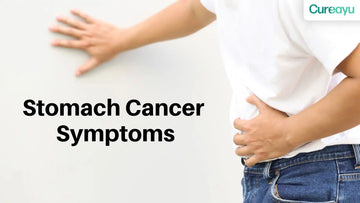Stomach cancer, also known as gastric cancer, is one of the leading causes of cancer-related deaths worldwide. Despite advances in medical science, this form of cancer often goes undetected in its early stages due to vague or non-specific symptoms. Early detection is crucial, as it significantly improves treatment outcomes and survival rates.
In this blog, we will delve deep into the world of stomach cancer, shedding light on its symptoms, types, causes, and risk factors. Additionally, we’ll discuss prevention tips that can help reduce your risk of developing this life-threatening condition. Awareness is the first step toward taking control of your health, so let’s explore this important topic.
Also Read: Types Of Cancer: What, Where and How of the Cancer Varieties
What Is Stomach Cancer?
Stomach cancer occurs when abnormal cells in the stomach lining grow uncontrollably, forming a malignant tumor. The stomach, a vital organ in the digestive system, is responsible for breaking down and digesting food. Cancer can disrupt its function and spread to other parts of the body if not treated promptly.
Stomach cancer typically starts in the inner lining of the stomach (mucosa) and may spread to deeper layers or nearby organs, such as the liver or pancreas. It progresses slowly, which is why early-stage symptoms often go unnoticed. There are different types of stomach cancer, each with unique characteristics, which we will explore later in this blog.
Also Read: Lung Cancer Symptoms: A Detailed Guide to Causes, Warning Signs, and Prevention
Stomach Cancer Symptoms
1. Persistent Indigestion and HeartburnFrequent episodes of indigestion or acid reflux that do not improve with medication may indicate stomach cancer. These symptoms occur as cancer affects the stomach lining, disrupting normal digestion.
2. Loss of Appetite
A noticeable decline in appetite, especially a sudden aversion to certain foods, is a common symptom. This can lead to unintentional weight loss, which is another warning sign.
3. Abdominal Pain and Discomfort
Pain or discomfort in the upper abdomen that doesn’t go away might be a sign of stomach cancer. The pain is often vague but persistent.
4. Nausea and Vomiting
Cancer can block the stomach, leading to nausea and vomiting, sometimes with blood. Vomiting blood (hematemesis) is a serious symptom that requires immediate medical attention.
5. Feeling Full Quickly
A condition known as early satiety, where you feel full after eating small amounts, may be due to a tumor restricting stomach space.
6. Fatigue and Weakness
Stomach cancer can cause anemia due to chronic blood loss, leading to fatigue, weakness, and pale skin.
7. Black or Tarry Stools
Stools that appear black or tarry may indicate internal bleeding caused by stomach cancer. This is another symptom that warrants urgent medical evaluation.
Types of Stomach Cancer
1. AdenocarcinomaThe most common type of stomach cancer, adenocarcinoma, originates in the glandular cells of the stomach lining. It accounts for 90-95% of cases.
2. Lymphoma
This type of cancer develops in the immune system tissues located in the stomach wall. Though rare, it requires distinct treatment compared to adenocarcinoma.
3. Gastrointestinal Stromal Tumor (GIST)
GIST arises in the stomach’s connective tissues or muscles and is considered a type of soft tissue sarcoma.
4. Carcinoid Tumors
Carcinoid tumors originate in hormone-producing cells of the stomach. They grow slowly and rarely spread to other parts of the body.
Also Read: Skin Cancer Symptoms: Guide on Early Detection, Types, Causes, and Treatments
What Causes Stomach Cancer?
1. Infection with Helicobacter PyloriThis bacterial infection is a major cause of stomach cancer, as it leads to chronic inflammation and damage to the stomach lining.
2. Genetic Mutations
Inherited genetic conditions, such as hereditary diffuse gastric cancer (HDGC), increase the risk of stomach cancer.
3. Diet and Lifestyle
A diet high in salty, smoked, or pickled foods and low in fresh fruits and vegetables can contribute to stomach cancer.
4. Smoking and Alcohol Consumption
Both smoking and excessive alcohol use have been linked to a higher risk of developing stomach cancer.
5. Chronic Gastritis
Long-term inflammation of the stomach lining, often due to autoimmune conditions or prolonged use of NSAIDs, can increase cancer risk.
Risk Factors
- Age: Most cases occur in people over 50.
- Gender: Men are more likely to develop stomach cancer than women.
- Family History: A family history of stomach cancer increases the risk.
- Diet: Consuming processed or preserved foods regularly elevates risk.
- Obesity: Excess weight increases abdominal pressure, contributing to reflux and stomach cancer.
- Previous Stomach Surgery: Surgeries like gastrectomy can change the stomach environment, increasing cancer risk.
Also Read: Understanding Prostate Problems: Symptoms, Causes, and Solutions
Prevention for Stomach Cancer
1. Maintain a Balanced DietIncorporate plenty of fresh fruits, vegetables, and whole grains into your meals. Avoid processed, salty, or smoked foods.
2. Avoid Tobacco and Limit Alcohol
Quit smoking and moderate alcohol consumption to reduce the risk of stomach cancer.
3. Manage Helicobacter Pylori Infections
If diagnosed with H. pylori, seek medical treatment to reduce chronic inflammation and the risk of cancer.
4. Exercise Regularly
Physical activity helps maintain a healthy weight and lowers cancer risk.
5. Regular Screenings
If you have a family history of stomach cancer, periodic screenings can help detect abnormalities early.
Conclusion
Stomach cancer is a serious health condition, but early detection and lifestyle modifications can significantly improve outcomes. By recognizing the symptoms, understanding the causes, and taking preventive measures, you can reduce your risk of developing this disease.
Awareness is a powerful tool in combating stomach cancer. If you experience persistent digestive issues or any other concerning symptoms, consult a healthcare professional promptly. With advancements in medical care and a proactive approach, you can safeguard your health and lead a fulfilling life.








